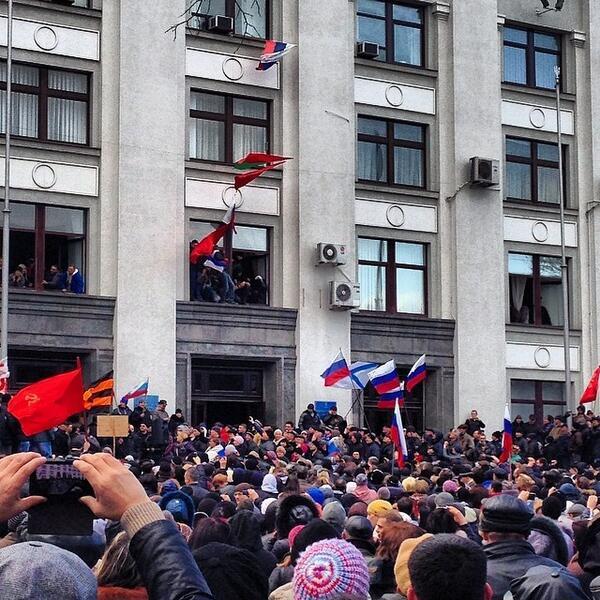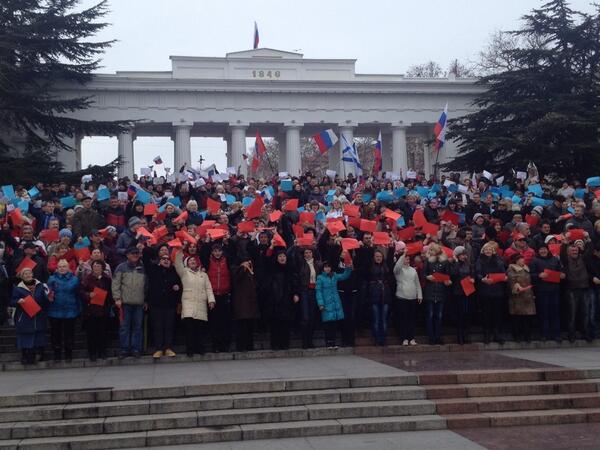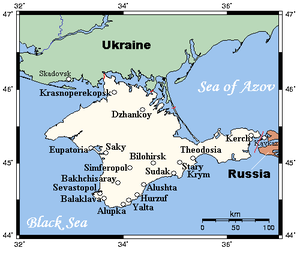India weighs in on Ukraine......
India Backs Russia's "Legitimate Interests" In Ukraine
Submitted by Tyler Durden on 03/08/2014 21:40 -0500
Submitted by Zachary Zeck via The Diplomat,
On Thursday a senior Indian official appeared to endorse Russia’s position in Ukraine in recent days, even as Delhi urged all parties involved to seek a peaceful resolution to the diplomatic crisis.
When asked for India’s official assessment of the events in Ukraine, National Security Adviser Shivshankar Menon responded:
“We hope that whatever internal issues there are within Ukraine are settled peacefully, and the broader issues of reconciling various interests involved, and there are legitimate Russian and other interests involved…. We hope those are discussed, negotiated and that there is a satisfactory resolution to them.”
The statement was made on the same day that Crimea’s parliament voted to hold a referendum for secession from Ukraine.
Local Indian media noted that Menon’s statement about Russia’s legitimate interests in Ukraine made it the first major nation to publicly lean toward Russia. As my colleague Shannon has reported throughout the week, many of China’s public statements could be interpreted as backing Russia in Ukraine, despite Beijing’s own concerns about ethnic breakaway states and its principle of non-interference.
However, at other times, including at the UN Security Council, Beijing has appeared to be subtly rebuking Moscow by suggesting that its unilateral paththreatened regional and global stability. At the very least, however, Beijing has characteristically not gone as far as the U.S. and the West in publicly scolding Vladimir Putin for the military intervention in Crimea.
Ukraine certainly appeared to interpret India’s endorsement of Russia’s legitimate interests as far more hostile than Beijing’s position on Russia’s actions. According to the Telegraph India, a Ukrainian embassy spokesperson stationed in Delhi responded to Menon’s comments by saying: “We are not sure how Russia can be seen having legitimate interests in the territory of another country. In our view, and in the view of much of the international community, this is a direct act of aggression and we cannot accept any justification for it.”
The larger question, of course, is why India decided to take such a relatively pro-Russian stance on the Ukraine issue? There are a number of possibilities.
First, India and Russia have long-standing ties and Moscow is Delhi’s top arms provider. Moreover, Russia and the former Soviet Union has been nearly alone in the international community in continue to back India during crucial moments suchas following its 1974 and 1998 nuclear tests.
It’s also possible that Delhi believes Russia’s intervention offers the best chance of stabilizing Ukraine. India’s Foreign Ministry on Thursday also released a statement noting that there are “more than 5,000 Indian nationals, including about 4,000 students, in different parts of Ukraine.” At the same time, India’s overall interest in Ukraine is fairly negligible—certainly less than China’s, for instance—and thus Delhi might assess that it has more to gain by publicly sticking by Moscow at a time when it desperately needs support.
India also has plenty of interests in certain regions along its peripheral, and at certain times—such as during the Sri Lanka Civil War—has intervened to protect various societal groups with strong ties to India. Unlike China, then, India may assess it has an interest in an international precedent in which major powers can intervene in countries along their borders. At the same time, such an international precedent could be used by Pakistan to justify intervening in Kashmir.
Telegraph India offers another reason.According to the report cited above, Indian officials have told Telegraph India that, in the newspaper’s words, Delhi is “convinced that the West’s tacit support for a series of attempted coups against democratically elected governments — in Egypt, Thailand and now Ukraine — has only weakened democratic roots in these countries.”
This rationale would be consistent with India’s long-standing, deep-seated abhorrence to anything that merely resembles Western imperialism. At the same time, India has not historically made supporting democracy abroad a central tenet of its foreign policy.
More in-roads in East Ukraine made by pro- russian protesters.....
More in-roads in East Ukraine made by pro- russian protesters.....
Another East-Ukraine City Falls To Pro-Russian Protesters As Ukraine Denies Sending Troops To Crimea
Submitted by Tyler Durden on 03/09/2014 09:04 -0500
Despite clear evidence otherwise, presented here extensively yesterday, this morning Ukraine has denied that is has "plans to send armed forces to Crimea" and instead Ukrainian troops are performing "training exercises" in base, Interfax news agency quoted Acting Defence Minister Ihor Tenyukh as saying on Sunday. Responding to media speculation about Ukrainian military movements after Russian forces took control of Crimea, Tenyukh said the only troop movements that might be seen would be from one base to another to take part in the training exercises. "No movements, no departures for Crimea by the armed forces are foreseen. They are doing their routine work which the armed have always had," he said. Right, and Russia just happened to launch an ICBM as a "drill" in the middle of the greatest Cold War re-escalation in 30 years.
Adding somewhat to the confusion was the statement by Pavlo Shysholin, head of country’s border guard service tells reporters in Kiev, who said that so far Ukrainian border guards denied entry to 3,500 people and that Ukraine border troops remain in Crimea, would leave only if "forced" but more importantly:
- UKRAINE BORDER TROOPS BOOST FORCES ON EAST BORDER: SHYSHOLIN
So there is an escalation in the mobilization, only not toward Crimea, which the Russians already control entirely, but the critical East, which as everyone knows, is the next target for Putin annexation once the Crimean referendum passes in one week.
Confirming just this were just released photos from another major city in east Ukraine, this time Lugansk, where pro-Russian protesters just stormed and took over the city administration building. Their demand: to be part of the March 16 referendum to become part of Russia.
A clip of the latest peaceful pro-Russian takeover via LifeNews:
Lugansk's location in context:
And so one by one, the cities in east Ukraine are slipping away to Russia, even as Obama continues his Key Largo vacation and makes the occasional phone call.
Why London, Too, Will Balk At Sanctions Against Russia (And Putin Knows It)
Submitted by Tyler Durden on 03/09/2014 19:43 -0400
A week ago, when the idea of sanctions against Russia was first officially announced, we made a statement, which was obviously in jest yet which, as so often happens, was so rooted in reality:
Russia today
Sunday, March 9, 2014
Ukraine Post Revolution Updates - Focus on Crime Re-Revolution --
As Crime moves toward its March 16 , 2014 Referendum concerning
joining the Russian Federation , rallies in support of vote continue in
Crimea and rallies in favor of Russian intervention occur in Eastern
Ukraine ......... The new Ukrainian government continues to take
actions to deter the vote occurring - the latest step being blocking the
electronic system of Crimea's Treasury and freezing the Autonomy
accounts ( state pensions not affected for now , Crimean Authorities
respond by opening accounts with Russian Banks . ) ......... Austerity
to be imposed on Kiev coup government ( to accompany planned
pension cuts of up to fifty percent for working pensioners ) ........ Anti-
fascist march activists were shot minutes after their protest finished
in Kharkov, Ukraine, LifeNews and Glagol reported. A bus with ten
people inside stopped and began shooting at the activists. The men
then came closer and reportedly began beating the activists. Three
people were injured, one of whom sustained a gunshot wound in his
back ...... The EU and US still conferring ( by phone ) to come up
with a strategy that will slow down the referendum tide in Crimea ,
Eastern European countries and the US support strong sanctions
against Russia while Germany , France , Italy and UK adverse to
imposing meaningful Russia sanctions.....
Today's headlines......
http://rt.com/news/kiev-clashes-rioters-police-571/
Sunday, March 9
13:17 GMT:
Thousands anti-Maidan demonstrators rallying in the eastern Ukrainian city of Lugansk have blocked and occupied the regional administration building, hoisting a Russian flag on its top. The protesters are demanding Mikhail Bolotskikh, the region’s head, picked by coup-imposed Kiev government, to step down.
According to Itar-Tass, some 3,000 people are taking part in the Lugansk protests and about 1,000 have broken inside the building.
According to Itar-Tass, some 3,000 people are taking part in the Lugansk protests and about 1,000 have broken inside the building.
13:05 GMT:
One “does not talk in the language of sanctions in the modern world,” special representative of the Russian President at Shanghai Cooperation Organization (SCO), Kirill Barsky, said in a statement published on the Russian Foreign Ministry’s website.
“In today’s world, which is connected through and through by the binding fabric of globalization, the very idea of international isolation of a large state, let alone that of a world power, should a priori be perceived by any reasonable man as an obvious oddity,” Barsky said.
“In today’s world, which is connected through and through by the binding fabric of globalization, the very idea of international isolation of a large state, let alone that of a world power, should a priori be perceived by any reasonable man as an obvious oddity,” Barsky said.
12:55 GMT:
Russia’s Foreign Minister Sergey Lavrov, and his German counterpart, Frank-Walter Steinmeier, have discussed the situation in Ukraine over the phone and ways of solving the current crisis there, according to a statement, issued by the Russian Foreign Ministry.
12:40 GMT:
Ukrainian Railways (UZ) have stopped selling tickets to trains going to Crimea, according to an official statement on the company’s website. UZ have given an assurance that those who had already bought tickets will be able to reach their destination. However, it was not immediately clear if and when the railway routes would be resumed and in service again.
As of Sunday, Russian Railways (RZD) are still selling tickets to Crimea.
Crimean Vice-Premier Rustam Temirgaliev told Interfax that the authorities are expecting that some additional railway traffic to and from Russia will be ferried over the Kerch Strait. A bridge connecting Kerch and Russia’s Krasnodar Region is also being built “at a rapid pace,” he said.
As of Sunday, Russian Railways (RZD) are still selling tickets to Crimea.
Crimean Vice-Premier Rustam Temirgaliev told Interfax that the authorities are expecting that some additional railway traffic to and from Russia will be ferried over the Kerch Strait. A bridge connecting Kerch and Russia’s Krasnodar Region is also being built “at a rapid pace,” he said.
08:59 GMT:
Around 10,000 people have taken part in a rally in support of Ukraine in Maikop, in the Russian Republic of Adygea, local police report, as cited by Interfax.
08:54 GMT:
Ukraine’s self-imposed authorities have blocked the electronic system of Crimea’s treasury and frozen the autonomy’s accounts, said Crimean Deputy PM Rustam Temirgaliyev. However, he says this will not affect state payments like pensions, Interfax reports.
“We are now quickly opening accounts in Russian banks, including ruble accounts. People won’t have to go without pensions; the situation is under control,” he said, adding that local authorities will prevent any “catastrophic consequences” of Kiev’s recent move.
08:52 GMT:
Konstantin Dolgov, the Russian Foreign Ministry’s commissioner for human rights in his twitter uged western politicians not to let the leader of the Ukrainian ultra nationalist group “Right Sector”, Dmitry Yarosh, come to power.
“De-facto authorities in Kiev and their western patrons must block the access to power for neo nazi Yarosh and his backers,” Dolgov wrote.
“De-facto authorities in Kiev and their western patrons must block the access to power for neo nazi Yarosh and his backers,” Dolgov wrote.
08:45 GMT:
Five regional heads of police have been dismissed by Ukrainian Interior Minister Arsen Avakov, who announced the decision on his Facebook page. Those fired include Igor Avrutsky, the head of the Crimean police.
08:34 GMT:
According to estimates by Crimean authorities, two thirds of the region’s residents could vote in favor of joining Russia. RT’s Paula Slier went to Crimea’s capital, Simferopol, to collect opinions on the issue from people in the streets.
06:55 GMT:
Rallies in support of Ukraine and Russians living there will be held in a number of Russian cities on March 9 and 10. According to organizers, cited by Itar-Tass, around 30,000 people will take part. Rallies are expected to take place in Astrakhan, Pskov, Arkhangelsk, Chelyabinsk, Vologda, Perm and Chita.
06:52 GMT:
The Ukrainian coup-imposed government has announced its officials are subject to austerity cuts. The measure is “aimed at stabilizing the economic situation in the country as well as for saving and rational use of government funds,” the Ukrainian cabinet of ministers’ online statement reads. Austerity cuts are announced for government bodies and many kinds of state-sponsored enterprises and organizations. They have been ordered to stop buying cars (except ambulance, fire-fighting and rescue vehicles), furniture, mobile phones, laptops, etc. Charter flights and phone calls will no longer be reimbursed from the budget. Government officials will see their allowances cut.
Saturday, March 8
23:12 GMT:
The anti-fascist march activists were shot minutes after their protest finished in Kharkov, Ukraine, LifeNews and Glagol reported. A bus with ten people inside stopped and began shooting at the activists. The men then came closer and reportedly began beating the activists. Three people were injured, one of whom sustained a gunshot wound in his back.
22:31 GMT:
US President Barack Obama and French President Francois Hollande agreed in a phone conversation on Saturday to establish a contact group to help settle the Ukrainian crisis, which will require Russian consent. In case this does not work out, the West will be forced to introduce new measures that will "have a substantial impact on relations between the international community and Russia,” ITAR-TASS quoted the the Elysee Palace as saying.
“In the current serious circumstances, they stressed the importance for Russia to accept the formation of a contact group for initiating dialogue between Ukraine and Russia, in order to promote a peaceful way out of the crisis promptly and fully restore the sovereignty and territorial integrity of Ukraine,” Elysee Palace added.
22:11 GMT:
Around 3,000 people attended a rally on Kharkov's central square to voice support for ethnic Russians living in Crimea, on Saturday, Ruptly news agency reports. A heavy police presence was seen on the square, where they guarded the city hall and regional administration buildings.
Protesters chanted slogans such as "Russia-Russia", "Kharkiv-Kharkiv", and "Fascism will not pass".
Organizers of the rally voiced their willingness to protect Kharkiv from Kiev's new interim authorities. Organizers also stated they want to stop 'Bandera fascists from Kiev', and reinstate relations with 'brotherly Russia'.
Protesters chanted slogans such as "Russia-Russia", "Kharkiv-Kharkiv", and "Fascism will not pass".
Organizers of the rally voiced their willingness to protect Kharkiv from Kiev's new interim authorities. Organizers also stated they want to stop 'Bandera fascists from Kiev', and reinstate relations with 'brotherly Russia'.
















 The deployments come just a week before the planned Crimean referendum on secession from the Ukraine. Russia is backing the referendum, and Russian parliament has expressed support for annexing Crimea should the voters demand it.
The deployments come just a week before the planned Crimean referendum on secession from the Ukraine. Russia is backing the referendum, and Russian parliament has expressed support for annexing Crimea should the voters demand it.
No comments:
Post a Comment